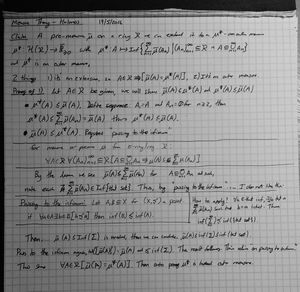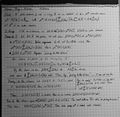Talk:Extending pre-measures to outer-measures
Proving it extends problem
(These notes are being made before bed) The problem I'm having is showing ˉμ(A)≤μ∗(A), I have worked out I need to do something involving two infimums. I know that for A∈R and a (An)∞n=1⊆R such that A⊆⋃∞n=1An we have ˉμ(A)≤∑∞n=1ˉμ(An). However we have:
- μ∗(A):=inf{∑∞n=1ˉμ(An)|(An)∞n=1⊆R∧A⊆⋃n=1A∞n}⏟exactly the conditions for ˉμ(A)≤∑∞n=1ˉμ(An)
But I am struggling to form a statement along the lines of "if we have a set which has members ≤ every member in {∑∞n=1ˉμ(An)|(An)∞n=1⊆R∧A⊆⋃n=1A∞n} how can I show the inf of that set is ≤ the inf of {∑∞n=1ˉμ(An)|(An)∞n=1⊆R∧A⊆⋃n=1A∞n}?" I remember doing this once before. I cannot recall what I did. A nudge in the right direction would be useful. Oh wait. I may have just got it. If I use the "epsilon definition" of an infimum which is something like (for a=inf(X)):
- ∀x∈X[a≤x] AND
- ∀ϵ>0∃y∈X[a+ϵ>y]
(I'm nearly falling asleep) then I can probably combine this with the epsilon-version of Greater than or equal to Alec (talk) 23:47, 9 April 2016 (UTC)


